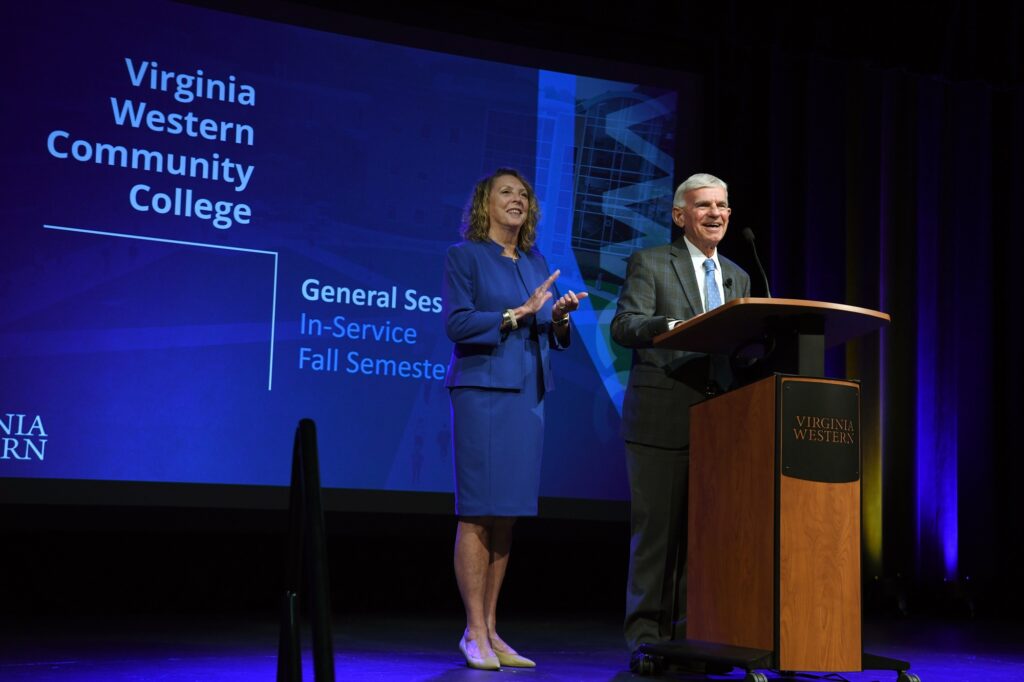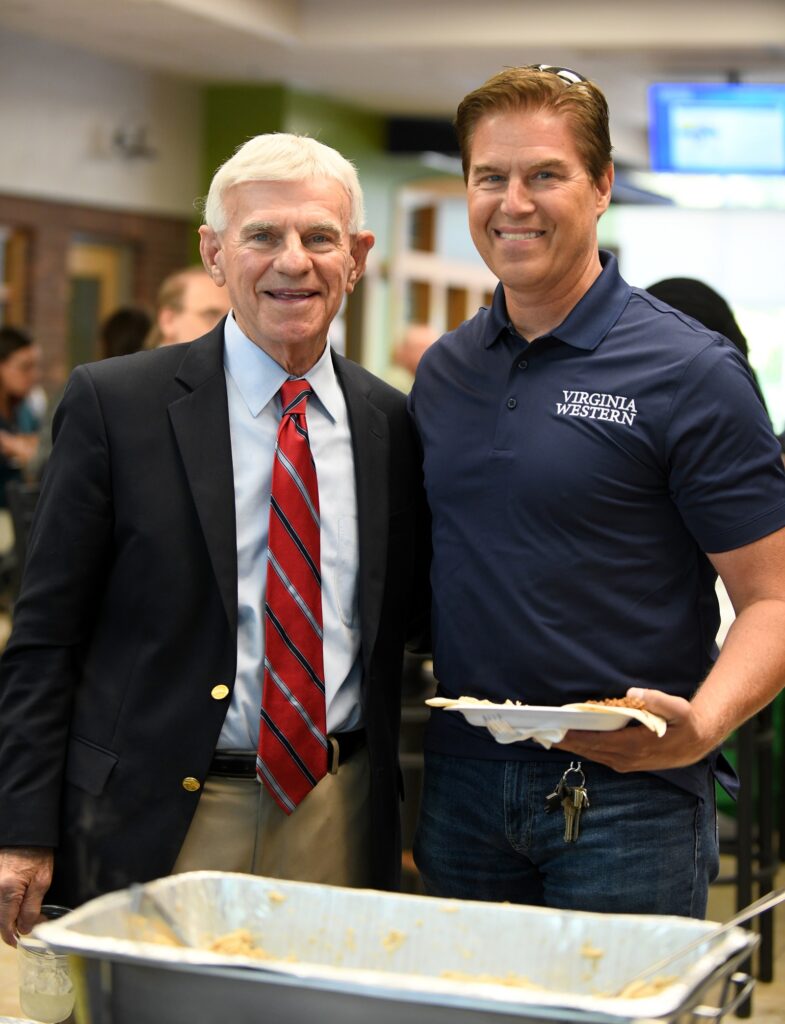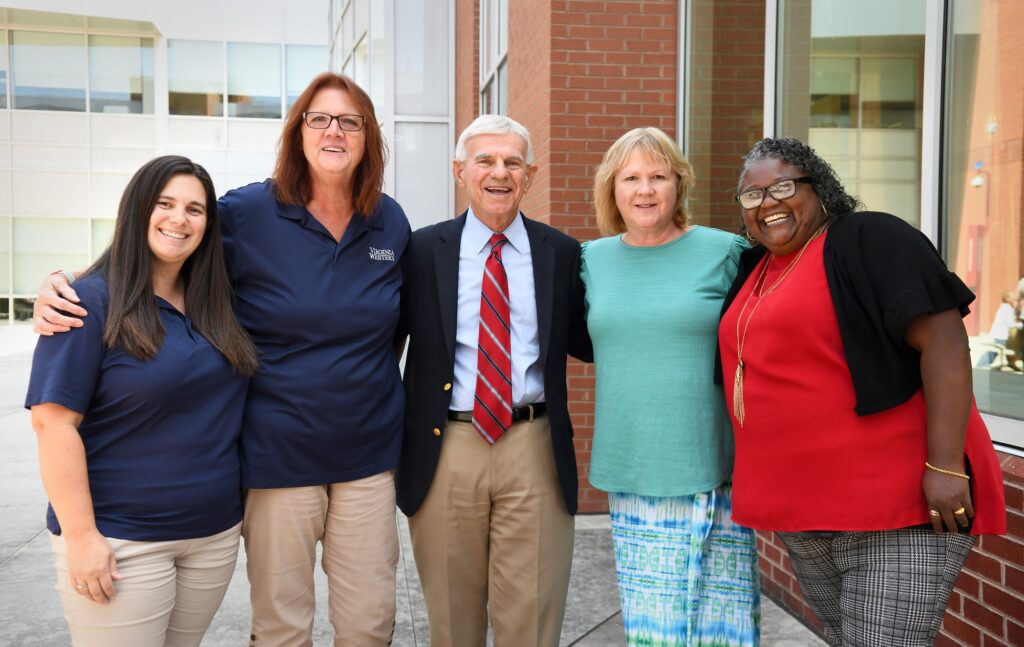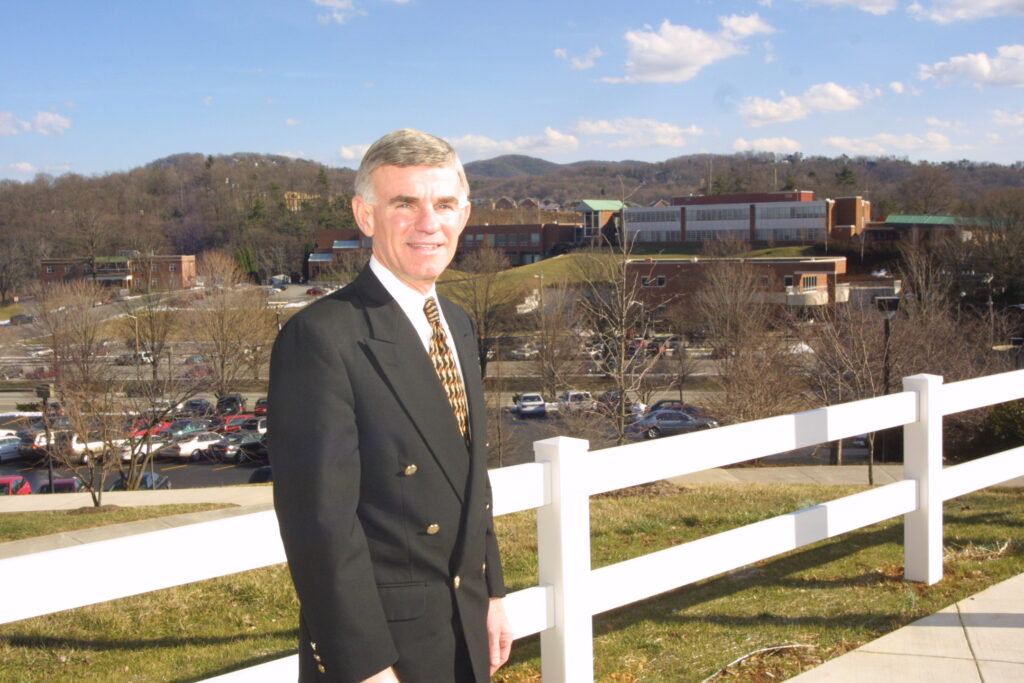Educational Foundation Philanthropy Director Amanda Mansfield sat down with Virginia Western President Robert H. “Bobby” Sandel shortly after he announced last summer that he would retire in 2025 after 24 years of service to the College. Their conversation touched on his philosophy regarding philanthropy, his perspective on how to build a holistic look at serving the community and his advice for the future.

Amanda: You’ve always said to me that you believe that no student should ever be denied an education due to financial constraints. Would you say that’s at the heart of your belief in philanthropy?
Bobby: Well, my philosophy on philanthropy is that it’s a necessity. It defines how you bring value-added service for the College, for the students and the community that you represent.
Virginia Western is the No. 1 educational entity in the region that most students and adults go to after high school. As a community college, we know many individuals need financial assistance beyond federal Pell funding, and our demographics show us that more and more students come to the College with different levels of income. Despite the fact our tuition is very reasonable, having an Educational Foundation working with the community college can go a long way. Our students need our help to fill the gap to make college possible for them.
Amanda: How did you begin to communicate your vision when you arrived at Virginia Western?

Bobby: When I came to Virginia Western, the first thing I felt we had to do was to listen to business and industry and develop relationships. Twenty-four years ago, Virginia Western didn’t necessarily have the reputation that it could have. There were a lot of perceptions — mostly misperceptions — about what Virginia Western was doing, and what it could do. We needed to correct that, and to help people understand that the community college is the community.
I wanted to meet and learn from folks who could make a difference, people who wanted to hire our graduates. First, we had to find out what programs and subject matters of expertise were needed. Second, we had to make sure that this college had those areas of expertise and programs in place. And third, we had to enroll talent in those programs to be able to build a workforce with the skills and abilities needed to meet those specifications.
We wanted companies using our workforce initiatives to get more and more out of our training programs. When I first got here, there was not a lot of information out there and not a lot of follow-through by Virginia Western to initiate training programs. People didn’t realize our training programs could be anytime, anywhere, any place — that we would work out a training schedule and customize training programs to meet their criteria, using their terminology, to meet their needs. And that really went over very, very well.
Amanda: How did you inspire the community to get even more involved?
Bobby: When you respond successfully to industry, industry partners will respond back to you in kind. One of the best ways to build a culture of philanthropy is to start with those who know firsthand who you are, and how hard you will work to make our corner of the world the best it can be. These are the partners that will stand first in line to give back to Virginia Western, because we’ve been of service to them. This is what creating value-added relationships is all about.
I also wanted to invite leaders to get involved in our cause. I was honored to be consistently serving on regional boards of directors, getting involved in leadership positions, meeting and working with other leaders and building value-added relationships. It has a ripple effect. Other leaders start preaching about what you’re talking about, and then still others absorb that message. Praise and advocacy are always better if they come from somebody else, rather than from me. I’m supposed to say those things, I’m the president. Our friends can make our case better than I can. That’s what you hope for.
Amanda: You’ve been at the heart of pioneering transformation and opportunity here at Virginia Western. Can you talk about that?
Bobby: So as a next step to adding value, and beyond direct support of particular industries, we wanted to lift the entire community and make a real change in higher education opportunity.
Back in the early 2000s, high school students were not graduating when they needed to graduate, and our city schools especially had a high non-graduation rate. We gathered a team of leaders to start talking about what the College and Foundation could do to address some of these issues. And, you know, all I did was fuel the fire. These leaders came up with the vision to offer some type of scholarship program that could fill the gap of financial need for students. And this was the birth of CCAP (Virginia Western’s Community College Access Program).
Amanda: More than 15 years later, CCAP has really taken off with donors. Why do you think that’s so?

Bobby: The beauty of the CCAP philanthropy model was the fact that we planned to match equally what the localities would give. That’s really unprecedented. You don’t find many foundations who ask for money, and also promise to match whatever is given. We found out quickly that everyone involved felt strongly that they did not want to disappoint students who wanted to go to the next step.
When we went to see Forest Jones, who was Salem city manager at the time, to pilot the idea, Forest didn’t blink. He said, “That is one of the most wonderful ideas I’ve ever heard. I’ll make sure that we can make this happen, and I really appreciate the fact that the Foundation is putting up their part.”
We went to Roanoke City schools next, and Rita Bishop was the superintendent at that time. And of course, she bought right into this. I always use her quote, one that has always stuck with me. She said, “Bobby, I have so many parents. And they’ll say there is no hope. There is hope now for my children to go to college.” There was, and there is, hope.
And then we began to see large numbers of students across our service area who started wanting CCAP. I think it surprised everyone, the number of students who were coming to Western. CCAP became the catalyst that got graduation rates going back up. It’s hard to believe it’s been 16 years.
Amanda: So much has changed — there has been so much growth over the years. Can you speak to that?

Bobby: That’s what I mean by the impact of focusing on value-added service, support and philanthropy. It transforms. The Educational Foundation has really, really grown — not only has CCAP exponentially grown from that beginning, but the Foundation now manages 153 other scholarships, and they’ve built a student emergency fund to help students facing critical life issues stay in school. What’s more, they’re making real headway to achieving a permanent unrestricted endowment to support all of these ideas and more into the future.
These are game-changers, things that would have been impossible to imagine at the start. All because we demonstrated we were here to grow and serve our community, and then asked for support to make that happen.
Amanda: You’ve frequently said, “It’s all about relationships.” What has been the most gratifying part for you personally about building those value-added relationships?
Bobby: People’s perceptions have changed. I went to a function the other day, and I had a key business leader come up to me, offered me his card and said, “I want to be a part of what y’all are about.” I didn’t go to him. He came to me.
Or someone will call me and say, “I want to help somebody.” Believe me, individuals are just as important as the big companies. They will reach out to you or me, or anyone in the Foundation because they feel that it’s easy to talk to any of us, because we are all here working toward the same goal — making college possible.
Amanda: What do you see as next for the Educational Foundation and all of these relationships?
Bobby: When you can harness opportunities that can come from a community, a foundation and a college working together as one, anything can happen.
Leadership matters. The leadership of the Foundation is a big part of that. It’s having the right people on the board who can think outside of the box and who challenge not just the College, but challenge the president to make this place the best it can be.
(This story was published in the Winter 2025 edition of Impact magazine, a publication of the Virginia Western Community College Educational Foundation.)





